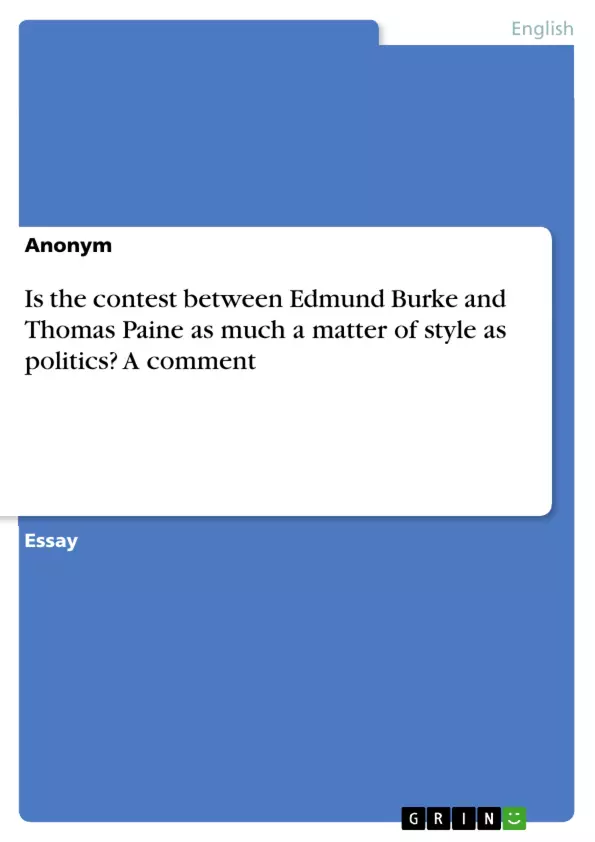The aim of this essay is to analyse whether the striking differences between the political ideologies of Thomas Paine and Edmund Burke are also mirrored on the level of their use of language and thus on the level of their styles. Burke’s Reflections on the Revolution in France and Paine’s Rights of Man, “the most successful of the many responses that Burke’s pamphlet provoked” (Hodson 115), are the basis for this investigation. I will argue that the widely spread assumption that the nature of Burke and Paine’s largely antithetic political ideas can be reflected in their respective styles needs to be reassessed and that – indeed surprisingly – there is no distinct/strong link between their political convictions on the one hand and their styles on the other hand.
Inhaltsverzeichnis (Table of Contents)
- Introduction
- Political ideas
- Correlation between style and political ideas?
- Conclusion
Zielsetzung und Themenschwerpunkte (Objectives and Key Themes)
This essay aims to determine whether the pronounced disparities between the political philosophies of Thomas Paine and Edmund Burke are reflected in their respective language usage and, consequently, their writing styles. The analysis focuses on Burke's "Reflections on the Revolution in France" and Paine's "Rights of Man," two prominent responses to the French Revolution. The essay will argue that while a direct link between political convictions and writing styles is often assumed, this assumption requires reevaluation, suggesting a surprising absence of a distinct connection between their political stances and their stylistic choices.
- Analysis of the stylistic differences and similarities between Burke and Paine's writing
- Examination of the relationship between political ideology and style
- Evaluation of the argument that Paine's style is "democratizing" while Burke's is "conservative" or "aristocratic"
- Discussion of the historical context of pamphlet writing during the French Revolution
- Exploration of the role of language and style in shaping public opinion
Zusammenfassung der Kapitel (Chapter Summaries)
- Introduction: This section introduces the essay's main argument and its focus on the relationship between political ideas and style in the works of Paine and Burke. It highlights the historical context of the French Revolution and the importance of pamphlet writing in shaping public opinion.
- Political Ideas: This chapter provides a concise overview of the major political ideas presented in "Reflections on the Revolution in France" and "Rights of Man." It summarizes Burke's emphasis on a sustainable and historically developed constitution, his caution against imitating the French Revolution, and his contrasting of the peaceful British situation with the chaotic French situation. It also highlights Paine's defense of the French Revolution and his argument for the natural rights of man, urging England to embrace the power of the current time and follow the French example.
- Correlation between Style and Political Ideas?: This central chapter analyzes in depth whether a correlation exists between the styles of Edmund Burke and Thomas Paine in their respective works and the political ideologies presented therein. It examines the views of scholars who argue for a correlation, suggesting that Paine's writing aligns with a democratizing political philosophy, while Burke's style reflects a conservative or aristocratic stance. The chapter also discusses the historical context of standardization and prescriptivism in 18th-century language, arguing that Paine's style challenged the "hegemony of language" and made political discourse accessible to a wider audience.
Schlüsselwörter (Keywords)
This essay explores the intricate relationship between political ideology and writing style, analyzing the works of Edmund Burke and Thomas Paine during the French Revolution. Key concepts include the influence of historical context, the role of language in shaping public opinion, the contrasting approaches of Burke and Paine, and the impact of stylistic choices on the reception of their ideas. The essay examines the "democratizing" aspects of Paine's style compared to the perceived "conservatism" or "aristocratism" of Burke's approach, ultimately challenging the assumption of a direct correlation between political ideology and style.
Frequently Asked Questions
What is the main ideological conflict between Edmund Burke and Thomas Paine?
Burke advocated for traditional, historically developed constitutions and cautioned against the chaos of the French Revolution, while Paine defended natural rights and urged for democratic reform.
Does writing style reflect political ideology in their works?
The essay argues that while often assumed, there is no distinct/strong link between their styles and political convictions; the relationship is more complex than a simple "conservative vs. democratic" style.
How did Thomas Paine's style democratize political discourse?
Paine used accessible, clear language that challenged the linguistic hegemony of the elite, making political ideas understandable for a wider, non-aristocratic audience.
Why is Burke's style often described as "aristocratic"?
His writing in "Reflections" is noted for its complexity, rhetorical flourishes, and appeals to tradition, which some scholars align with a conservative, high-class worldview.
What was the role of pamphlets during the French Revolution?
Pamphlets were the primary medium for shaping public opinion, allowing intellectuals to engage in rapid, influential debates over the future of governance and rights.
- Citar trabajo
- Anonym (Autor), 2014, Is the contest between Edmund Burke and Thomas Paine as much a matter of style as politics? A comment, Múnich, GRIN Verlag, https://www.grin.com/document/336372



